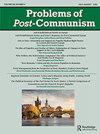黯然失色的斯大林:莫斯科古拉格历史博物馆是俄罗斯对苏联镇压的官方记忆的体现
IF 2
2区 社会学
Q2 POLITICAL SCIENCE
引用次数: 4
摘要
本文分析了莫斯科古拉格历史博物馆(GHM)的临时(2015年)和永久(2018年)展览,以及有关其创建的文件。分析显示了两个关键发现。首先,GHM聚焦于古拉格,忽略了后古拉格时期的苏联镇压,最终致力于将前者历史化。第二,在以斯大林之死作为永久展览的显著结尾时,GHM却淡化了他在镇压中的作用。古拉格成为了过去,成为了需要承认和抛弃的东西。然而,斯大林被从过去中提取出来:他作为官方“卫国战争”记忆的一部分,留在了现在。本文章由计算机程序翻译,如有差异,请以英文原文为准。
Eclipsing Stalin: The GULAG History Museum in Moscow as a Manifestation of Russia’s Official Memory of Soviet Repression
ABSTRACT This article analyzes the temporary (2015) and permanent (2018) expositions of Moscow’s GULAG History Museum (GHM), and the documents surrounding its creation. The analysis demonstrates two key findings. First, focusing on the Gulag and omitting post-Gulag Soviet repression, the GHM ultimately works to historicize the former. Second, while prominently ending the permanent exposition with Stalin’s death, the GHM nevertheless downplays his role in the repression. The Gulag becomes a thing of the past, something to acknowledge––and leave behind. Stalin, however, is extracted from that past: he remains in the present, as part of the official “Great Patriotic War” memory.
求助全文
通过发布文献求助,成功后即可免费获取论文全文。
去求助
来源期刊

Problems of Post-Communism
POLITICAL SCIENCE-
CiteScore
4.00
自引率
12.50%
发文量
33
期刊介绍:
The post-communist countries are the most rapidly changing societies of Europe and Asia. For insight into this twenty-first century revolution, there is no better source than Problems of Post-Communism. Emphasis is placed on timely research covering current economic, political, security, and international developments and trends in Russia and China, Central Europe and Central Asia, Latin America, and Southeast Asia. Clarity and readability make the articles fully accessible to researchers, policy makers, and students alike.
 求助内容:
求助内容: 应助结果提醒方式:
应助结果提醒方式:


